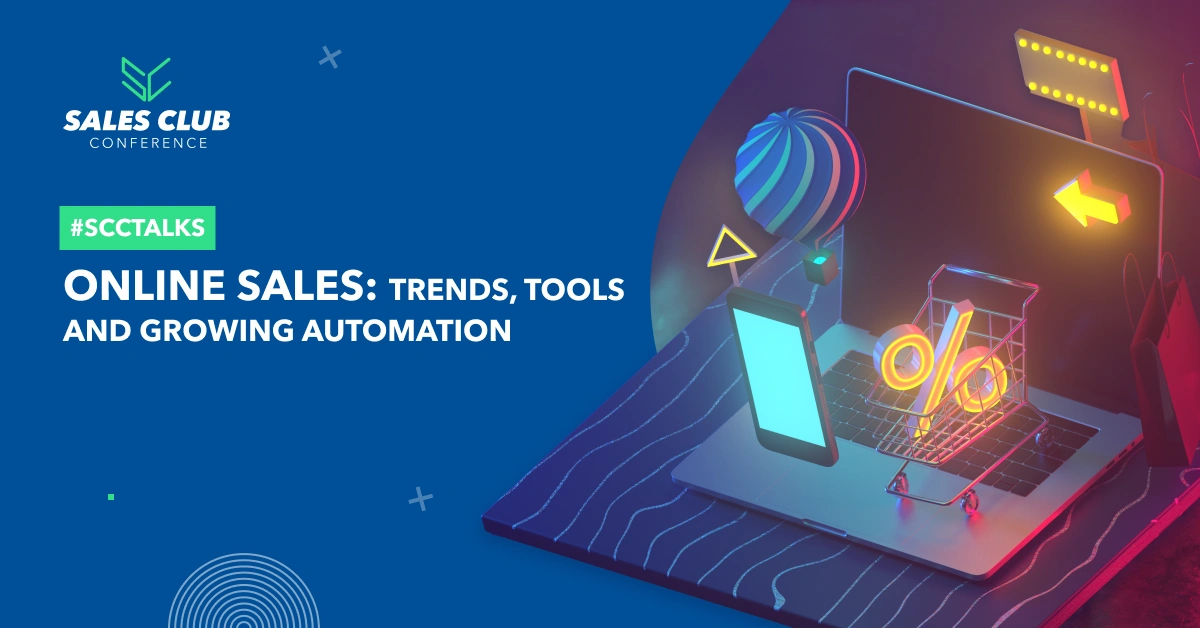Blog " Online Sales: Trends, Tools, and Increasing Automation
Marketplace platforms, ERP systems, and many other diverse factors make up today’s rich toolkit in the eCommerce world. But which of these is the key to successful online sales? We discuss this topic with Niki Dobrev and Zhorо Tashev – co-founders of the cloud software application Castelio, who for another year supported the Sales Club Conference.
Besides Castelio, the two are owners of several successful online stores across different sectors and have been active participants in our country’s eCommerce ecosystem for the past 10 years.
Hello Niki and Zoro, thank you for taking the time to join our little source of expertise and our #SCCTalks series. Castelio is a cloud-based software that helps businesses manage and operate their processes in one place. It solves numerous challenges related to integrations with partners, suppliers, couriers, and marketplace platforms.
What is the role of marketplace platforms and online sales platforms in eCommerce? This technology has firmly established itself in business and has brought significant changes. Where is the eCommerce sector heading today?
Zhoro: Marketplace platforms and online sales platforms play a significant role in eCommerce overall. They provide a central hub where multiple sellers can offer their products, making the available assortment wider and more diverse, which attracts more customers. This means that small and medium-sized businesses, which may not have the resources to build and manage their own online stores, can use marketplace platforms to reach a larger audience and compete effectively. Additionally, these platforms enable businesses to internationalize, expanding their reach beyond Bulgaria.
Absolutely, this creates a favorable environment for the growth of eCommerce. Online sales will continue to evolve and innovate, adapting to changing consumer preferences and technological advancements.
To what extent have online merchants learned to use various software solutions to optimize their business processes and improve their services? And once they have done so, do they focus their attention on the customer experience, or do they rather turn their attention to other challenges within the sector?
Zhoro: Online merchants have made significant investments in various software solutions and tools to optimize their business processes and improve their services. This includes the use of warehouse management software, customer relationship management (CRM) systems, order and delivery management software, analytics platforms, electronic payment systems, and many others.
Inventory management software helps merchants track product availability and predict their needs, enabling them to maintain optimal stock levels and avoid losses from unsold or excessive inventory.
Order and delivery management systems help speed up and optimize the process of processing orders and delivering them to customers, thereby improving the overall quality of customer service.
Many merchants use CRM software and marketing automation tools to personalize communication with their customers and offer more relevant products and services. In this way, they not only increase their revenue but also maximize the value they get from each customer.
There are also other software and tools that help merchants understand consumer behavior and optimize their marketing campaigns.
This is where Castelio comes in, bringing all business processes together in one place, automating them, and making work significantly more efficient.
Regarding focus, many online retailers combine their efforts to optimize processes with improving the customer experience. These two aspects are considered interconnected, as streamlined processes can contribute to better customer service. However, retailers also need to address other challenges such as competition, customer loyalty, marketing, and more. Therefore, optimizing business processes is just one aspect of their overall strategy.
How does online commerce improve the customer experience? How does a visitor become a customer?
Zhoro: Online commerce provides the opportunity to shop 24/7 from anywhere with an internet connection. This makes shopping easier and more convenient for users, as they are not limited by store hours or geographical restrictions. Online commerce also offers an extremely wide variety of products compared to physical stores, allowing users to compare and select products that best meet their needs and preferences.
It is much easier to compare product prices and promotions, read opinions and reviews, as well as recommendations from other users, which helps them make more informed decisions.
Many eCommerce platforms use technologies and software to track users’ preferences and purchases in order to provide personalized offers and promotions, making the shopping experience more individualized and engaging.
Delivery and product returns are an extremely easy process that can be carried out from home.
Last but not least, online stores often offer real-time chats, email, and phone support, which help users receive fast and effective assistance with any questions or issues.
To turn a visitor into a customer, it is important to provide the advantages mentioned above and create a positive online experience. This can be achieved through an optimized website design, easy navigation, high-quality product information, attractive promotions, and good customer support. Additionally, ensuring secure online payments and protecting users’ personal data is essential to increase their trust in the store and the products you offer.
Which factors determine the marketing strategy in online sales? Is consumer behavior among them?
Niki: Yes, consumer behavior is one of the key factors that determine the marketing strategy in online sales. Other factors include:
Competition – understanding what competitors are doing and how they position their products can help in developing a marketing strategy.
Product – the type of product being sold and its features will influence the marketing approach.
Target audience – knowing the target audience and what they want from a product will help shape the messages used in the marketing campaign.
Budget – the amount of available funds that can be spent on marketing activities will determine which channels and tactics can be used.
Timing – timing is crucial when launching a new product or running promotions. Knowing when to start and when to end campaigns is important for achieving success.
Personalization of marketing campaigns in online commerce: what are the tools and how do they differ from other marketing techniques?
Niki: Personalization in online marketing campaigns can be achieved through a variety of tools, including email marketing, social media marketing on platforms like Facebook, Instagram, and TikTok, search engine optimization (SEO), and content marketing. These tools differ from traditional marketing techniques in that they allow for more targeted and personalized messaging, reaching the right audience at the right time. Recently, email marketing has been somewhat underestimated, but in my view, it remains an extremely powerful channel. It allows marketers to segment their lists and send personalized messages to specific groups of people. Social media platforms, on the other hand, offer the opportunity to create content that resonates with users and engages them in conversations and discussions about the benefits or drawbacks of the promoted products or services.
What is the role of artificial intelligence in online commerce? How does it help? Where would it be positioned permanently? Will it replace human potential?
Niki: The role of artificial intelligence in online commerce is to automate routine processes as much as possible and to enhance the efficiency of customer service, while simultaneously reducing errors, human involvement, and associated costs
AI can assist with tasks such as product recommendations, fraud detection, customer segmentation, and more. It can also be used to analyze customer data and provide insights into how customers interact with a business. In my view, AI will not replace the human factor but rather complement it, providing more accurate and efficient solutions. AI is set to become an integral part of online commerce, as businesses continue to rely on data-driven solutions to remain competitive in the market.
What is the star team of specialists that guarantees a successful online business? What is the latest trend in the world of eCommerce?
NikiThe star team of professionals that ensures a successful online business typically includes web developers, designers, marketers, customer service staff, accountants, and other specialized roles. However, in small and micro businesses, these roles are often combined into just one or two people. The latest trend in the world of eCommerce is the rise of mobile commerce, which involves creating an optimized mobile experience for customers who can purchase products and services via their smartphones or tablets. Other trends include personalization of products and services at the level of advertising or the website itself, as well as the increasingly frequent use of artificial intelligence (AI) and augmented reality (AR) technology, which is expected to become much more prominent in our daily lives.








